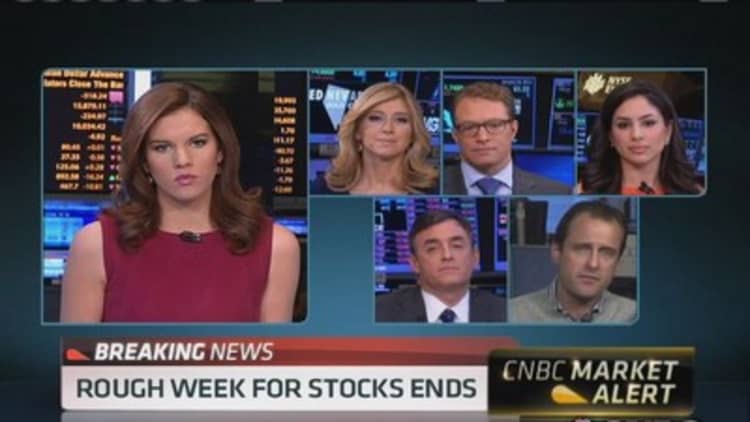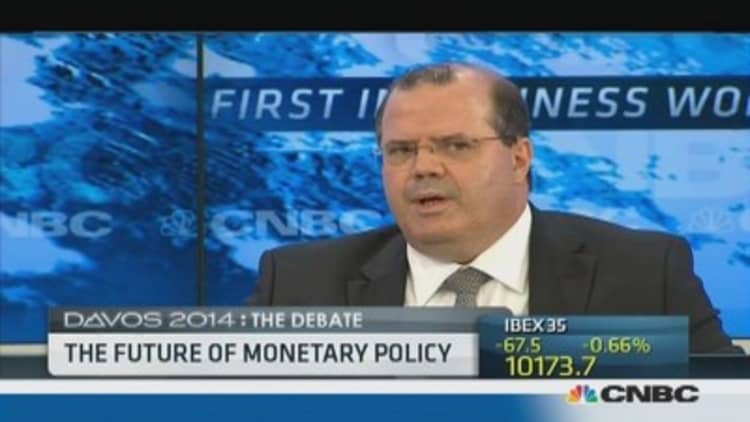
U.S. stocks fell sharply and Treasuries rallied on Friday, with the Dow Jones Industrial Average tumbling triple-digits for a second session and posting its worst week since November 2011, as investors pulled money from emerging markets and other assets viewed as risky.
As Wall Street's faith in some of the world's largest developed countries unraveled, currencies of those nations were hit, with Turkey's lira falling to a record low against the dollar, and Argentina's peso down sharply against the U.S. currency.
"We've touched off by what's going on around the world, so to speak, and are reallocating assets from some of the emerging markets into what is thought of as more reliable," said JJ Kinahan, chief strategist at TD Ameritrade. "It's a safe parking spot," Kinahan added of fixed income.

"It appears this is a wait-and-see equity market that lacks near-term conviction, which is understandable after the strong returns of 2013. The market priced in a lot of positive economic news in 2013, and we recently have seen readings that point to some uncertainty," said Terry Sandven, chief equity strategist at U.S. Bank Wealth Management.
"Emerging-market currencies have been coming under pressure causing some to erroneously point out it is because of the Fed taper. It is more because of political instability in countries like Argentina and Turkey, which is just another reason to stay underweight EM," Nick Raich, CEO at the Earnings Scout, wrote in emailed research.
Procter & Gamble on Friday reported , but the maker of diapers and detergent left its 2014 sales growth forecast unchanged. Microsoft , with shares of the software giant and Dow component rising.
So far, earnings haven't been "what we wanted to see for most companies. The CEOs in certain sectors, like technology and finance, have been pretty positive. But others say it's good, but not great, and they are not necessarily going out and hiring more people," said Kinahan.
Major U.S. Indexes
Losses accelerated into the close, with the Dow Jones Industrial Average falling 318.24 points, or 2 percent, at 15,879.11, down 3.5 percent for the week, its worst since November 2011, and off 4.2 percent since the end of 2013.
Falling under the 1,800 level seen as a key support, the tumbled 38.17 points, or 2.1 percent, to 1,790.29, with industrial companies hardest hit among its 10 major industry sectors, all of which fell. The S&P 500 posted a weekly drop of 2.6 percent, its worst week since June 1012.
The Nasdaq declined 90.7 points, or 2.2 percent, to 4,128.17, a weekly loss of 1.7 percent and down 1.2 percent for the year.
International Game Technology fell after the slot-machine maker's . Starbucks rose after the coffee-shop chain tallied quarterly profit that beat estimates.
The CBOE Volatility Index, or VIX, a measure of investor uncertainty, jumped nearly 32 percent to 18.14.
For every stock rising, more than six fell on the New York Stock Exchange, where 919 million shares traded. Composite volume exceeded 4.6 billion.

The yield on the 10-year note fell 6 basis points to 2.725 percent; gold for February delivery gained $2 to finish at $1,264.30 an ounce, up 0.9 percent for the week, and crude-oil futures for March delivery slipped 68 cents to $96.64 a barrel, up 2.4 percent for the week.
On Thursday, stocks fell sharply after a measure of Chinese manufacturing sparked concerns about the country's economic growth.
—By CNBC's Kate Gibson
More From CNBC.com:


